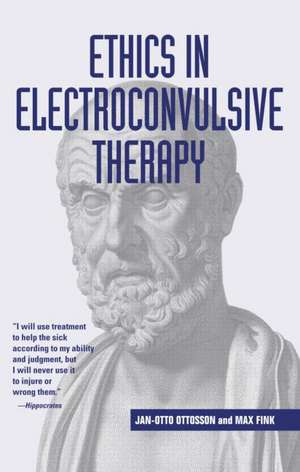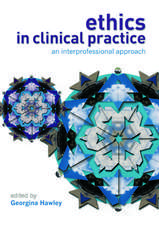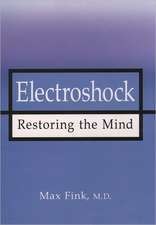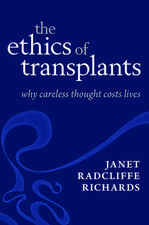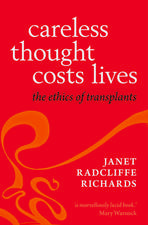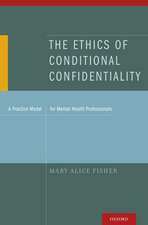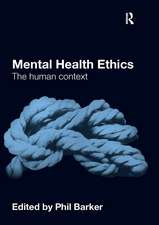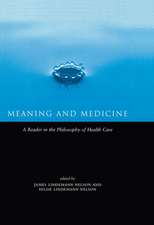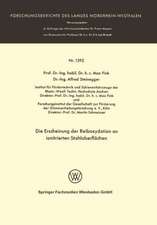Ethics in Electroconvulsive Therapy
Autor Jan-Otto Ottosson, Max Finken Limba Engleză Hardback – 17 iun 2004
The authors make a strong case for greater professional and public attention to the procedure's benefits, offering historical coverage of ECT-related movements, legislation, public and practitioner sentiment and the introduction of competing treatments. This volume will not only garner the interest of mental health professionals, but will call on policy makers and ethicists to examine its arguments.
Preț: 244.98 lei
Preț vechi: 325.38 lei
-25% Nou
Puncte Express: 367
Preț estimativ în valută:
46.88€ • 50.91$ • 39.38£
46.88€ • 50.91$ • 39.38£
Carte tipărită la comandă
Livrare economică 22 aprilie-06 mai
Preluare comenzi: 021 569.72.76
Specificații
ISBN-13: 9780415946599
ISBN-10: 041594659X
Pagini: 168
Dimensiuni: 152 x 229 x 14 mm
Greutate: 0.35 kg
Ediția:New.
Editura: Taylor & Francis
Colecția Routledge
Locul publicării:Oxford, United Kingdom
ISBN-10: 041594659X
Pagini: 168
Dimensiuni: 152 x 229 x 14 mm
Greutate: 0.35 kg
Ediția:New.
Editura: Taylor & Francis
Colecția Routledge
Locul publicării:Oxford, United Kingdom
Public țintă
Professional Practice & DevelopmentCuprins
Preface. The Stigmatization Of ECT. Principles Of Medical Ethics. Previous Ethical Approaches To ECT. Beneficence. Non-maleficence. Autonomy. Justice. Balancing. Ethical Principles. Conclusions. References. Biographies. Index
Recenzii
"Electroconvulsive therapy is one of the most effective treatments in psychiatry, indeed in all of medicine. Yet at the same time its misuse has been a tragedy. It is underutilized, unavailable to many who need it, poorly understood by the profession, and stigmatized by the public. Without powerful constituencies, such as those advocating pharmacotherapy, it has become an orphan treatment. In this important new book two of the world's experts on the treatment discuss its benefits, risks, and clinical role; its status in international psychiatry; and provide a careful ethical analysis of
the dilemmas that have accompanied its use. This is essential reading for those interested psychiatric treatment and the professional, social and ethical context in which it is, or at times tragically is not, provided to the mentally ill." -- Robert Michels, M.D., Walsh McDermott University Professor of Medicine and Psychiatry Cornell University
"In this authoritative, cutting-edge ethical analysis, Drs. Ottosson and Fink argue that patients who will benefit most from ECT should now have access to it throughout the world and prejudice and misinformation regarding ECT shouldn't prevent this. Psychiatrists can immediately implement the guidelines they provide. In light of these authors' arguments, psychiatrists not using ECT to treat the conditions they specify - psychotic depression, malignant catatonia, cycloid psychosis, acute delirium, malignant neuroleptic syndrome, post-partum psychosis, and Parkinsonism - may be no longer morally defensible." -- Edmund G. Howe, Professor of Psychiatry at the Uniformed Services University of the Health Sciences and Editor-in Chief of The Journal of Clinical Ethics
"This compact volume reads quickly and easily. The case material is rich and makes the concepts come alive in a way that will be useful for practitioners at all levels of experience. Ethics in Electroconvulsive Therapy should be part of the library of any psychiatrist interested in ECT.
." -- Journal of ECT
"Mandatory reading for every teacher of psychiatry and their students and residents...all medical school and health provider faculties and trainees would learn from its reading that the principles of medical ethics can and must be applied in daily practice." -- Neuropsychiatry Neuropsychology & Behavioral Neurology
"Here, in 127 pages, is the story of why one of psychiatry's most effective treatments has fallen victim to misunderstanding and stigmatization. Certainly, if you're someone influencing the care of sick or disturbed persons, you might appreciate this refresher course on the indications for electroconvulsive therapy (ECT), especially when it is the therapy of choice or could be lifesaving. In short, Ottosson and Fink review clinical indications of ECT and attempt to dispel some of the lingering biases that have arisen in the last fifty years." - Charles R. Young, retired, Christian Medican-Dental Society, Illinois, USA, in Ethics & Medicine, Fall 2010
the dilemmas that have accompanied its use. This is essential reading for those interested psychiatric treatment and the professional, social and ethical context in which it is, or at times tragically is not, provided to the mentally ill." -- Robert Michels, M.D., Walsh McDermott University Professor of Medicine and Psychiatry Cornell University
"In this authoritative, cutting-edge ethical analysis, Drs. Ottosson and Fink argue that patients who will benefit most from ECT should now have access to it throughout the world and prejudice and misinformation regarding ECT shouldn't prevent this. Psychiatrists can immediately implement the guidelines they provide. In light of these authors' arguments, psychiatrists not using ECT to treat the conditions they specify - psychotic depression, malignant catatonia, cycloid psychosis, acute delirium, malignant neuroleptic syndrome, post-partum psychosis, and Parkinsonism - may be no longer morally defensible." -- Edmund G. Howe, Professor of Psychiatry at the Uniformed Services University of the Health Sciences and Editor-in Chief of The Journal of Clinical Ethics
"This compact volume reads quickly and easily. The case material is rich and makes the concepts come alive in a way that will be useful for practitioners at all levels of experience. Ethics in Electroconvulsive Therapy should be part of the library of any psychiatrist interested in ECT.
." -- Journal of ECT
"Mandatory reading for every teacher of psychiatry and their students and residents...all medical school and health provider faculties and trainees would learn from its reading that the principles of medical ethics can and must be applied in daily practice." -- Neuropsychiatry Neuropsychology & Behavioral Neurology
"Here, in 127 pages, is the story of why one of psychiatry's most effective treatments has fallen victim to misunderstanding and stigmatization. Certainly, if you're someone influencing the care of sick or disturbed persons, you might appreciate this refresher course on the indications for electroconvulsive therapy (ECT), especially when it is the therapy of choice or could be lifesaving. In short, Ottosson and Fink review clinical indications of ECT and attempt to dispel some of the lingering biases that have arisen in the last fifty years." - Charles R. Young, retired, Christian Medican-Dental Society, Illinois, USA, in Ethics & Medicine, Fall 2010
